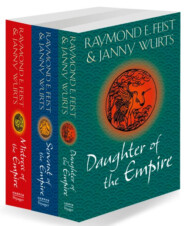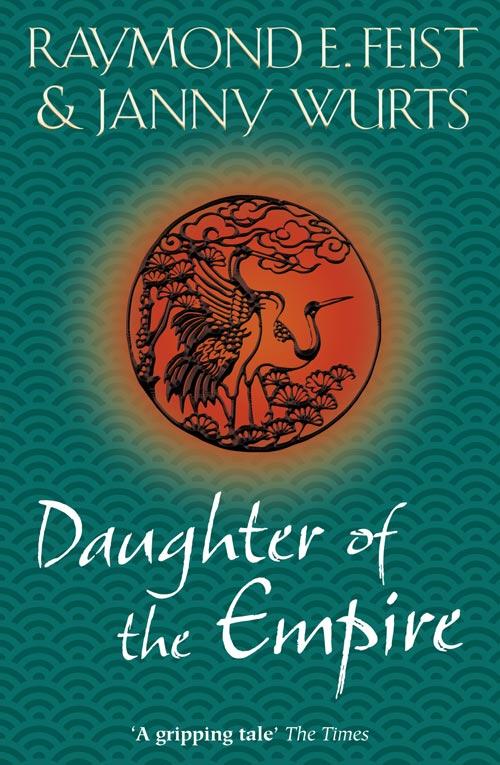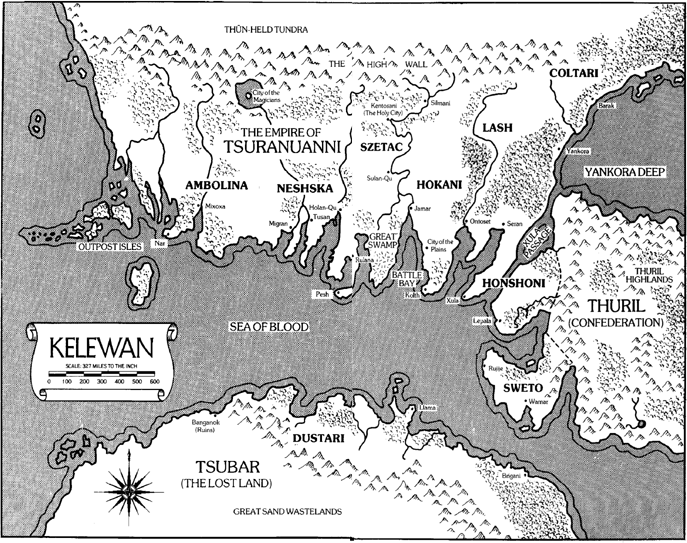
Полная версия:
The Complete Empire Trilogy: Daughter of the Empire, Mistress of the Empire, Servant of the Empire

RAYMOND E. FEIST
and
JANNY WURTS
The Empire Trilogy
Daughter of the Empire
Servant of the Empire
Mistress of the Empire


Copyright
This novel is entirely a work of fiction. The names, characters and incidents portrayed in it are the work of the author’s imagination. Any resemblance to actual persons, living or dead, events or localities is entirely coincidental.
HarperVoyager An imprint of HarperCollinsPublishers Ltd. 1 London Bridge Street London SE1 9GF
www.harpercollins.co.uk
First published in Great Britain by
Grafton Books 1987
Daughter of the Empire First published in Great Britain by Grafton Books 1987
Copyright © Raymond E. Feist and Janny Wurts 1987
Servant of the Empire First published in Great Britain by Grafton Books 1990
Copyright © Raymond E. Feist and Janny Wurts 1990
Mistress of the Empire First published in Great Britain by Grafton Books 1992
Copyright © Raymond E. Feist and Janny Wurts 1992
The Authors assert the moral right to be identified as the authors of this work
A catalogue record for this book is available from the British Library
All rights reserved under International and Pan-American Copyright Conventions. By payment of the required fees, you have been granted the nonexclusive, nontransferable right to access and read the text of this ebook on screen. No part of this text may be reproduced, transmitted, downloaded, decompiled, reverse engineered, or stored in or introduced into any information storage and retrieval system, in any form or by any means, whether electronic or mechanical, now known or hereinafter invented, without the express written permission of HarperCollins ebooks
HarperCollinsPublishers has made every reasonable effort to ensure that any picture content and written content in this ebook has been included or removed in accordance with the contractual and technological constraints in operation at the time of publication
Ebook Edition © MARCH 2013 ISBN: 9780007518760
Version: 2018-5-14
Table of Contents
Cover
Title Page
Copyright
Daughter of the Empire
Servant of the Empire
Mistress of the Empire
About the Author
Also by the Author
About the Publisher

RAYMOND E. FEIST
and
JANNY WURTS
Daughter of the Empire
Book One of the Empire Trilogy

This book is dedicated to
Harold Matson
with deep appreciation, respect, and affection
Table of Contents
Cover
Title Page
Dedication
Map
Chapter One: Lady
Chapter Two: Evaluations
Chapter Three: Innovations
Chapter Four: Gambits
Chapter Five: Bargain
Chapter Six: Ceremony
Chapter Seven: Wedding
Chapter Eight: Heir
Chapter Nine: Snare
Chapter Ten: Warlord
Chapter Eleven: Renewal
Chapter Twelve: Risks
Chapter Thirteen: Seduction
Chapter Fourteen: Acceptance
Chapter Fifteen: Arrival
Chapter Sixteen: Funeral
Chapter Seventeen: Revenge
Acknowledgements
Map

• Chapter One • Lady
The priest struck the gong.
The sound reverberated off the temple’s vaulted domes, splendid with brightly coloured carvings. The solitary note echoed back and forth, diminishing to a remembered tone, a ghost of sound.
Mara knelt, the cold stones of the temple floor draining the warmth from her. She shivered, though not from chill, then glanced slightly to the left, where another initiate knelt in a pose identical to her own, duplicating Mara’s movements as she lifted the white head covering of a novice of the Order of Lashima, Goddess of the Inner Light. Awkwardly posed with the linen draped like a tent above her head, Mara impatiently awaited the moment when the headdress could be lowered and tied. She had barely lifted the cloth and already the thing dragged at her arms like stone weights! The gong sounded again. Reminded of the goddess’s eternal presence, Mara inwardly winced at her irreverent thoughts. Now, of all times, her attention must not stray. Silently she begged the goddess’s forgiveness, pleading nerves – fatigue and excitement combined with apprehension. Mara prayed to the Lady to guide her to the inner peace she so fervently desired.
The gong chimed again, the third ring of twenty-two, twenty for the gods, one for the Light of Heaven, and one for the imperfect children who now waited to join in the service of the Goddess of Wisdom of the Upper Heaven. At seventeen years of age, Mara prepared to renounce the temporal world, like the girl at her side who – in another nineteen chimings of the gong – would be counted her sister, though they had met only two weeks before.
Mara considered her sister-to-be: Ura was a foul-tempered girl from a clanless but wealthy family in Lash Province while Mara was from an ancient and powerful family, the Acoma. Ura’s admission to the temple was a public demonstration of family piety, ordered by her uncle, the self-styled family Lord, who sought admission into any clan that would take his family. Mara had come close to defying her father to join the order. When the girls had exchanged histories at their first meeting, Ura had been incredulous, then almost angry that the daughter of a powerful Lord should take eternal shelter behind the walls of the order. Mara’s heritage meant clan position, powerful allies, an array of well-positioned suitors, and an assured good marriage to a son of another powerful house. Her own sacrifice, as Ura called it, was made so that later generations of girls in her family would have those things Mara chose to renounce. Not for the first time Mara wondered if Ura would make a good sister of the order. Then, again not for the first time, Mara questioned her own worthiness for the Sisterhood.
The gong sounded, deep and rich. Mara closed her eyes a moment, begging for guidance and comfort. Why was she still plagued with doubts? After eighteen more chimes, family, friends, and the familiar would be forever lost. All her past life would be put behind, from earliest child’s play to a noble daughter’s concern over her family’s role within the Game of the Council, that never-ending struggle for dominance which ordered all Tsurani life. Ura would become her sister, no matter the differences in their heritage, for within the Order of Lashima none recognized personal honour or family name. There would remain only service to the goddess, through chastity and obedience.
The gong rang again, the fifth stroke. Mara peeked up at the altar atop the dais. Framed beneath carved arches, six priests and priestesses knelt before the statue of Lashima, her countenance unveiled for the initiation. Dawn shone through the lancet windows high in the domes, the palest glow reaching like fingers through the half-dark temple. The touch of sunrise seemed to caress the goddess, softening the jewel-like ceremonial candles that surrounded her. How friendly the lady looked in morning’s blush, Mara thought. The Lady of Wisdom gazed down with a half-smile on her chiselled lips, as if all under her care would be loved and protected, finding inner peace. Mara prayed this would be true. The only priest not upon his knees again rang the gong. Metal caught the sunlight, a splendid burst of gold against the dark curtain that shrouded the entrance to the inner temple. Then, as the dazzling brilliance faded, the gong rang again.
Fifteen more times it would be struck. Mara bit her lip, certain the kind goddess would forgive a momentary lapse. Her thoughts were like flashing lights from broken crystals, dancing about here and there, never staying long in one place. I’m not very good material for the Sisterhood, Mara confessed, staring up at the statue. Please have patience with me, Lady of the Inner Light. Again she glanced at her companion; Ura remained still and quiet, eyes closed. Mara determined to imitate her companion’s behaviour outwardly, even if she couldn’t find the appropriate calm within. The gong sounded once more.
Mara sought that hidden centre of her being, her wal, and strove to put her mind at rest. For a few minutes she found herself successful. Then the beat of the gong snatched her back to the present. Mara shifted her weight slightly, rejecting irritation as she tried to ease her aching arms. She fought an urge to sigh. The inner calm taught by the sisters who had schooled her through her novitiate again eluded her grasp, though she had laboured at the convent for six months before being judged worthy of testing here in the Holy City by the priests of the High Temple.
Again the gong was struck, as bold a call as the horn that had summoned the Acoma warriors into formation. How brave they all had looked in their green enamelled armour, especially the officers with their gallant plumes, on the day they left to fight with the Warlord’s forces. Mara worried over the progress of the war upon the barbarian world, where her father and brother fought. Too many of the family’s forces were committed there. The clan was split in its loyalty within the High Council, and since no single family clearly dominated, blood politics bore down heavily upon the Acoma. The families of the Hadama Clan were united in name only, and a betrayal of the Acoma by distant cousins who sought Minwanabi favour was not outside the realm of possibility. Had Mara a voice in her father’s counsel, she would have urged a separation from the War Party, even perhaps an alliance with the Blue Wheel Party, who feigned interest only in commerce while they quietly worked to balk the power of the Warlord …
Mara frowned. Again her mind had been beguiled by worldly concerns. She apologized to the goddess, then pushed away thoughts of the world she was leaving behind.
Mara peeked as the gong rang again. The stone features of the goddess now seemed set in gentle rebuke; virtue began with the individual, she reminded. Help would come only to those who truly searched for enlightenment. Mara lowered her eyes.
The gong reverberated and through the dying shiver of harmonics another sound intruded, a disturbance wholly out of place. Sandals scuffed upon stone in the antechamber, accompanied by the dull clank of weapons and armour. Outside the curtain an attending priest challenged in a harsh whisper, ‘Stop, warrior! You may not enter the inner temple now! It is forbidden!’
Mara stiffened. A chilling prescience passed through her. Beneath the shelter of the tented headcloth, she saw the priests upon the dais rise up in alarm. They turned to face the intruder, and the gong missed its beat and fell silent.
The High Father Superior moved purposefully towards the curtain, his brow knotted in alarm. Mara shut her eyes tightly. If only she could plunge the outside world into darkness as easily, then no one would be able to find her. But the sound of footfalls ceased, replaced by the High Father Superior’s voice. ‘What cause have you for this outrage, warrior! You violate a most holy rite.’
A voice rang out. ‘We seek the Lady of the Acoma!’
The Lady of the Acoma. Like a cold knife plunged into the pit of her stomach, the words cut through Mara’s soul. That one sentence forever changed her life. Her mind rebelled, screaming denial, but she willed herself to remain calm. Never would she shame her ancestors by a public display of grief. She controlled her voice as she slowly rose to her feet. ‘I am here, Keyoke.’
As one, the priests and priestesses watched the High Father Superior cross to stand before Mara. The embroidered symbols on his robes of office flashed fitfully as he beckoned to a priestess, who hastened to his side. Then he looked into Mara’s eyes and read the contained pain hidden there. ‘Daughter, it is clear Our Mistress of Wisdom has ordained another path for you. Go with her love and in her grace, Lady of the Acoma.’ He bowed slightly.
Mara returned his bow, then surrendered her head covering to the priestess. Oblivious to Ura’s sigh of envy, she turned at last to face the bearer of those tidings which had changed her life.
Just past the curtain, Keyoke, Force Commander of the Acoma, regarded his mistress with weary eyes. He was a battle-scarred old warrior, erect and proud despite forty years of loyal service. He stood poised to step to the girl’s side, provide a steadying arm, perhaps even shield her from public view should the strain prove too much.
Poor, ever-loyal Keyoke, Mara thought. This announcement had not come easily for him either. She would not disappoint him by shaming her family. Faced with tragedy, she maintained the manner and dignity required of the Lady of a great house.
Keyoke bowed as his mistress approached. Behind him stood the tall and taciturn Papewaio, his face as always an unreadable mask. The strongest warrior in the Acoma retinue, he served as both companion and body servant to Keyoke. He bowed and held aside the curtain for Mara as she swept past.
Mara heard both fall into step, one on each side, Papewaio one pace behind, correct in form to the last detail. Without words she led them from the inner temple, under the awning that covered the garden court separating the inner and outer temples. They entered the outer temple, passing between giant sandstone columns that rose to the ceiling. Down a long hall they marched, past magnificent frescos depicting tales of the goddess Lashima. Desperately attempting to divert the pain that threatened to overwhelm her, Mara remembered the story each picture represented: how the goddess outwitted Turakamu, the Red God, for the life of a child; how she stayed the wrath of Emperor Inchonlonganbula, saving the city of Migran from obliteration; how she taught the first scholar the secret of writing. Mara closed her eyes as they passed her favourite: how, disguised as a crone, Lashima decided the issue between the farmer and his wife. Mara turned her eyes from these images, for they belonged to a life now denied her.
All too soon she reached the outer doors. She paused a moment at the top of the worn marble stairs. The courtyard below held a half company of guards in the bright green armour of the Acoma. Several showed freshly bandaged wounds, but all came to attention and saluted, fist over heart, as their Lady came into view. Mara swallowed fear: if wounded soldiers stood escort duty, the fighting must have been brutal indeed. Many brave warriors had died. That the Acoma must show such a sign of weakness made Mara’s cheeks burn with anger. Grateful for the temple robe that hid the shaking in her knees, she descended the steps. A litter awaited her at the bottom. A dozen slaves stood silently by until the Lady of the Acoma settled inside. Then Papewaio and Keyoke assumed position, one on each side. On Keyoke’s command, the slaves grasped the poles and lifted the litter on to sweating shoulders. Veiled by the light, embroidered curtain on either side of the litter, Mara sat stiffly as the soldiers formed up before and after their mistress.
The litter swayed slightly as the slaves started towards the river, threading an efficient course through the throng who travelled the streets of the Holy City. They moved past carts pulled by sluggish, six-legged needra and were passed in turn by running messengers and trotting porters with bundles held aloft on shoulder or head, hurrying their loads for clients who paid a premium for swift delivery.
The noise and bustle of commerce beyond the gates jolted Mara afresh; within the shelter of the temple, the shock of Keyoke’s appearance had not fully registered. Now she battled to keep from spilling tears upon the cushions of the litter as understanding overwhelmed her. She wanted not to speak, as if silence could hide the truth. But she was Tsurani, and an Acoma. Cowardice would not change the past, nor forever stave off the future. She took a breath. Then, drawing aside the curtain so she could see Keyoke, she voiced what was never in doubt.
‘They are both dead.’
Keyoke nodded curtly, once. ‘Your father and brother were both ordered into a useless assault against a barbarian fortification. It was murder.’ His features remained impassive, but his voice betrayed bitterness as he walked at a brisk pace beside his mistress.
The litter jostled as the slaves avoided a wagon piled with jomach fruit. They turned down the street towards the landing by the river while Mara regarded her clenched hands. With focused concentration, she willed her fingers to open and relax. After a long silence she said, ‘Tell me what happened, Keyoke.’
‘When the snows on the barbarian world melted we were ordered out, to stand against a possible barbarian assault.’ Armour creaked as the elderly warrior squared his shoulders, fighting off remembered fatigue and loss, yet his voice stayed matter-of-fact. ‘Soldiers from the barbarian cities of Zun and LaMut were already in the field, earlier than expected. Our runners were dispatched to the Warlord, camped in the valley in the mountains the barbarians call the Grey Towers. In the Warlord’s absence, his Subcommander gave the order for your father to assault the barbarian position. We –’
Mara interrupted. ‘This Subcommander, he is of the Minwanabi, is he not?’
Keyoke’s weathered face showed a hint of approval as if silently saying, you’re keeping your wits despite grief. ‘Yes. The nephew of Lord Jingu of the Minwanabi, his dead brother’s only son, Tasaio.’ Mara’s eyes narrowed as he continued his narrative. ‘We were grossly outnumbered. Your father knew this – we all knew it – but your father kept honour. He followed orders without question. We attacked. The Subcommander promised to support the right flank, but his troops never materialized. Instead of a coordinated charge with ours, the Minwanabi warriors held their ground, as if preparing for counterattack. Tasaio ordered they should do so.
‘But just as we were overwhelmed by a counterattack, support arrived from the valley, elements of the forces under the banner of Omechkel and Chimiriko. They had no hint of the betrayal and fought bravely to get us out from under the hooves of the barbarians’ horses. The Minwanabi attacked at this time, as if to repulse the counterattack. They arrived just as the barbarians retreated. To any who had not been there from the start, it was simply a poor meeting with the barbarian enemy. But the Acoma know it was Minwanabi treachery.’
Mara’s eyes narrowed, and her lips tightened; for an instant Keyoke’s expression betrayed concern that the girl might shame her father’s memory by weeping before tradition permitted. But instead she spoke quietly, her voice controlled fury. ‘So my Lord of the Minwanabi seized the moment and arranged for my father’s death, despite our alliance within the War Party?’
Keyoke straightened his helm. ‘Indeed, my Lady. Jingu of the Minwanabi must have ordered Tasaio to change the Warlord’s instructions. Jingu moves boldly; he would have earned Tasaio the Warlord’s wrath and a dishonourable death had our army lost that position to the barbarians. But Almecho needs Minwanabi support in the conquest, and while he is angry with Jingu’s nephew, he keeps silent. Nothing was lost. To outward appearances, it was simply a standoff, no victor. But in the Game of the Council, the Minwanabi triumph over the Acoma.’ For the first time in her life, Mara heard a hint of emotion in Keyoke’s voice. Almost bitterly, he said, ‘Papewaio and I were spared by your father’s command. He ordered us to remain apart with this small company – and charged us to protect you should matters proceed as they have.’ Forcing his voice back to its usual brisk tone, he added, ‘My Lord Sezu knew he and your brother would likely not survive the day.’
Mara sank back against the cushions, her stomach in knots. Her head ached and she felt her chest tighten. She took a long, slow breath and glanced out the opposite side of the litter, to Papewaio, who marched with a studied lack of expression. ‘And what do you say, my brave Pape?’ she asked. ‘How shall we answer this murder visited upon our house?’
Papewaio absently scratched at the scar on his jaw with his left thumb, as he often did in times of stress. ‘Your will, my Lady.’
The manner of the First Strike Leader of the Acoma was outwardly easy, but Mara sensed he wished to be holding his spear and unsheathed sword. For a wild, angry instant Mara considered immediate vengeance. At her word, Papewaio would assault the Minwanabi lord in his own chamber, in the midst of his army. Although the warrior would count it as an honour to die in the effort, she shunted away the foolish impulse. Neither Papewaio nor any other wearing the Acoma green could get within half a day’s march of the Minwanabi lord. Besides, loyalty such as his was to be jealously guarded, never squandered.
Removed from the scrutiny of the priests, Keyoke studied Mara closely. She met his gaze and held it. She knew her expression was grim and her face drawn and chalky, but she also knew she had borne up well under the news. Keyoke’s gaze returned forward, as he awaited his mistress’s next question or command.
A man’s attention, even an old family retainer’s, caused Mara to take stock of herself, without illusions, being neither critical nor flattering. She was a fair-looking young woman, not pretty, especially when she wrinkled her brow in thought or frowned in worry. But her smile could make her striking – or so a boy had told her once – and she possessed a certain appealing quality, a spirited energy, that made her almost vivacious at times. She was slender and lithe in movement, and that trim body had caught the eye of more than one son of a neighbouring house. Now one of those sons would likely prove a necessary ally to stem the tide of political fortune that threatened to obliterate the Acoma. With her brown eyes half-closed, she considered the awesome responsibility thrust upon her. She realized, with a sinking feeling, that the commodities of womankind – beauty, wit, charm, allure – must all now be put to use in the cause of the Acoma, along with whatever native intelligence the gods had granted her. She fought down the fear that her gifts were insufficient for the task; then, before she knew it, she was recalling the faces of her father and brother. Grief rose up within her, but she forced it back deep. Sorrow must keep until later.
Softly Mara said, ‘We have much to talk of, Keyoke, but not here.’ In the press of city traffic, enemies might walk on every side, spies, assassins, or informants in disguise. Mara closed her eyes against the terrors of imagination and the real world both. ‘We shall speak when only ears loyal to the Acoma may overhear.’ Keyoke grunted acknowledgement. Mara silently thanked the gods that he had been spared. He was a rock, and she would need such as he at her side.



